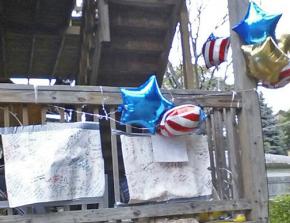A message from the West Side
Hundreds of people protested on Chicago's West Side August 27, four days after police shot 18-year-old Roshad McIntosh. The demonstration brought together residents of the neighborhood with people from around the city to demand justice for another victim of the cops. Police claim McIntosh pointed a gun at officers, but those who live in the neighborhood tell a different story--both about the shooting and the long history of police brutality.
, a victim of the Chicago police torture ring led by Jon Burge, spent 28 years in prison for a crime he didn't commit. Today, he is an activist against police brutality and the injustice system, serving on the board of the Campaign to End the Death Penalty. Here, he gives his perspective of the protest against the police murder of Roshad McIntosh.
I WAS standing in the heart of a last-minute mobilization to ensure that the message comes through loud and clear--that Roshad McIntosh was murdered in cold blood by members of the Chicago Police Department, and that we call on the city of Chicago to take action against the cops.
The West Side of Chicago is known for its share of violent crimes, but this murder is causing anger among residents, who explain that Roshad was attempting to surrender when police opened fire on him.
It was very energizing for me to see hundreds of people gathered to call for action in wake of this young African American man being killed by police, execution-style.
Residents had heard the news that the commander of the police district where the officers who shot Roshad were from had been arrested for a case of police torture in 2013. Commander Glenn Evans had placed a gun inside the mouth of a suspect during an interrogation--the man's DNA was found on the barrel of Evans' gun.
This gives you a taste of how Chicago can be. It's a city with a history of police carrying out acts of torture to frame innocent people. I learned this firsthand when I was tortured by police under the command of Jon Burge. I was a 16 year old kid who was forced into making a false confession, and I spent 28 years in prison until I was finally freed at age 44.

I have been free for five years, and during that period, I have learned of many cases all over the country where young African American men were executed by cops who didn't have to fire their weapons, but did it anyway, killing innocent people. In New York City this summer, Eric Gardner was killed by police who claim he was selling cigarettes outside a store.
Roshad McIntosh must be considered another victim of police, just like Mike Brown, and his case warrants the Justice Department involvement.
As a victim of torture taught me something about the need to understand the importance of unity. The system doesn't want us acting out of love and unity because we would win. "It was acts of unity and dedication among ordinary people that got the indictment against Commander Evans," said Tio Hardiman, a Chicago community activist who is running for governor of Illinois.
"The people must stand, and you will see that we can win. But if we do nothing, then that is what we get," Hardiman told protesters as he encouraged people to stand up and take back our streets. The crowd raised their voices together, demanding that the officers involved in the McIntosh killing be indicted for murder--now and not later.
"I just want peace and justice, and I want justice for my son now, not later," said Dawn McIntosh, Roshad's mother, at an emotional press conference that community organizations helped to arrange. "I can't see my son. I have been denied all police reports, and the autopsy report. They promised me I would have them."
We were able to draw attention to the McIntosh case and letting the District 11 police know it's time for a change because of our focus on how they are treating suspects. "The community is mad--real mad," said Shelly Ross, a longtime resident on Polk Street, where Roshad was shot. Those who attended vowed to keep up the pressure on the Chicago police.


